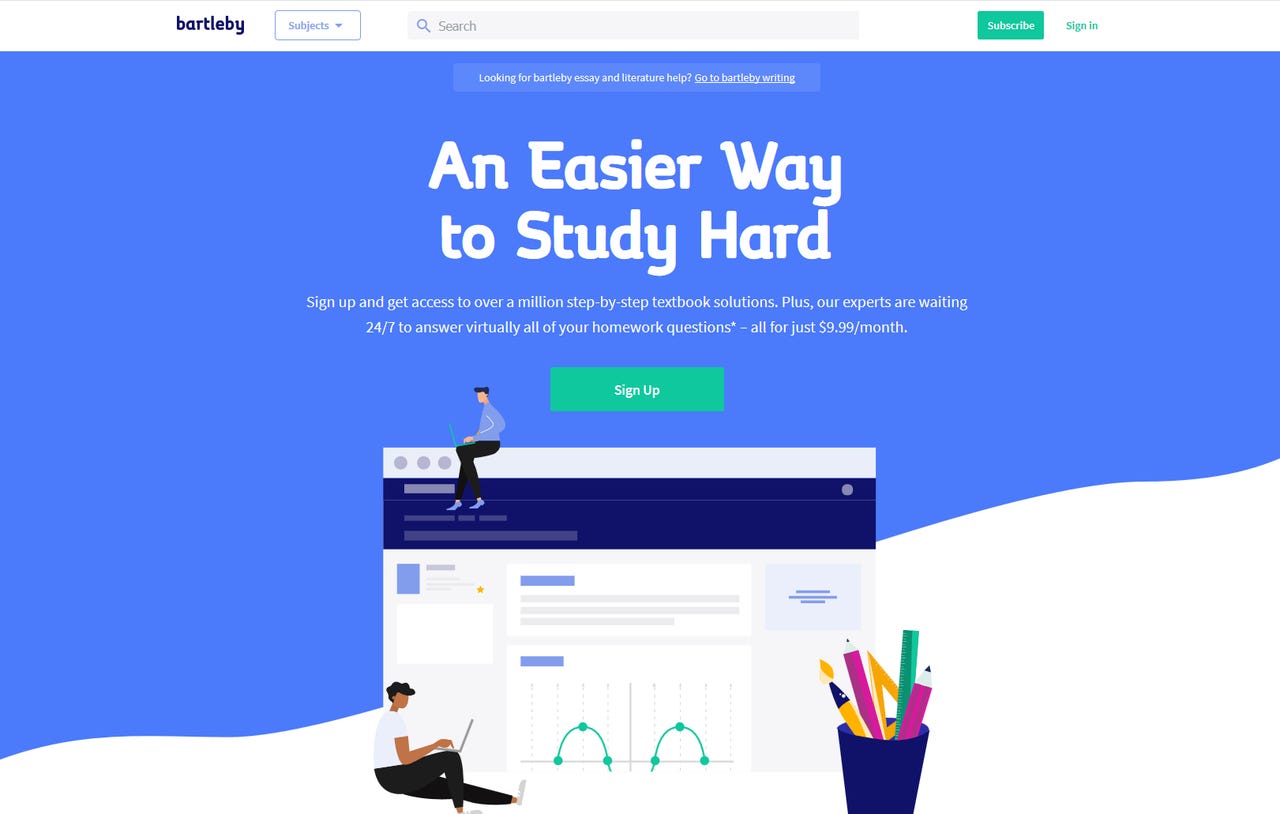Barnes & Noble Education bets on digital service Bartleby, but competition is fierce


Featured
Barnes & Noble Education is in a race to go digital amid steep competition in the higher education textbook market as well as customer shifts. The big question is whether its new digital platform, called Bartleby, can scale fast enough to offset a decline in its traditional business.
Bartleby is a subscription service that offers textbooks and experts to help with homework questions for $9.99 a month. Currently, Barnes & Noble Education offers a 50-percent off promotion so the first month is $4.99.
The company, which was split from Barnes & Noble, saw its fiscal third quarter sales fall 8.8 percent to $550.3 million. The two analysts covering the company projected sales of $586 million to $596 million. Net income in the third quarter was $800,000. Like its former parent, Barnes & Noble Education is struggling to compete with digital rivals and students questioning the old model of pricey textbooks and fat margins for publishers and retailers.
According to the company, its digital unit delivered sales of $5.2 million, down 6 percent from a year ago. Barnes & Noble Education didn't give a subscriber figure for its digital services.
Barnes & Noble Education said it expects sales to be between $2.15 billion to $2.2 billion with consolidated adjusted EBITDA of $100 million. That outlook was short of expectations and the company's shares tanked 32 percent on Tuesday. Barnes & Noble Education also said it would have higher capital expenses as it spends on digital.
Despite a digital transformation pivot that resembles the one attempted by Barnes & Noble, CEO Michael Huseby is optimistic about Bartleby. He said on a conference call:
The Bartleby study subscription is a new direct-to-student product that provides access to step-by-step textbook solutions and expert Q&A. After initial soft launch in August, January marked the start of our first selling season for Bartleby within our store footprint. It was a very encouraging start to what we project as an important driver for long-term growth. In January and February, we proved out our strategy of leveraging our vast store footprint and strong relationships with faculty, administrators and students to introduce new scalable and valuable digital products and services. Each day, we are improving Bartleby's ability to compete by significantly expanding the number of textbook solutions we offer students.
We're pleased to report that we surpassed the 1 million mark of such (textbook) solutions in January. Because of our unique role as the campus physical or virtual bookstore, we know which course materials are most widely adopted by faculty and used by students and which subject students are most frequently struggling to master.
Bartleby gained more than 50,000 subscribers through the Spring rush period and Huseby was encouraged by the number of sales driven by in-store personnel. The subscriber surge was due to promotions and Huseby said the company was "working hard to convert to satisfy paying customers," he said.
Huseby added that Barnes & Noble Education will experiment with content and pricing models as well as expand its content library. Huseby acknowledged that "any digital transformation takes longer than many of us would like, or at times, even have the patience for," but he remained optimistic in the company's ability to execute.
Must read
- Best E-Book Readers for 2019 (CNET)
- Best Tablets for 2019 (CNET)
Tough competition
The problem for Barnes & Noble Education is that the competition is fierce. In its annual report, the company listed the following digital rivals:
Broader competitors include companies such as former parent BN.com, eCampus, IndiCo, Apple, Blackboard and a bevy of others. In most categories--book content, rentals and student learning -- Chegg spanned multiple areas.
Chegg reported 3.1 million annual subscribers in its latest quarter with more than 2 million customers due to required materials. Chegg is targeting 2019 revenue between $390 million and $395 million. Chegg has a variety of services for K-12 and higher education.
The challenge for Barnes & Noble Education's digital efforts is that it doesn't have brand awareness yet. The plan is for the company to leverage its store base on campus to drive digital sales.
Can Barnes & Noble Education make the digital pivot? Possibly. Many colleges have outsourced their bookstores to the company and it could use those locations as marketing vehicles for digital subscriptions. The problem is that the digital consumption turn is speeding up and Barnes & Noble Education is playing from behind.
Buyer's remorse: Phones, tablets and more tech purchases we regret
More EdTech:
- Google for Education launches App Hub for K-12 Chromebook market
- How Apple, Google, and Microsoft stack up in education technology
- Microsoft touts new Windows 10 PCs aimed at Chromebooks in education
- Microsoft touts Office dictation, new Windows 10 devices starting at $189
- Apple Education Event: Can Apple cut into Google's education tech lead?
- Jamf acquires ZuluDesk, adds scale for Apple device management in education
- Education market takes flight at London's BETT show
- HP updates Chromebook education edition lineupDell, Acer add new Chromebooks
- HP adds AMD-powered Chromebooks to its education line-up